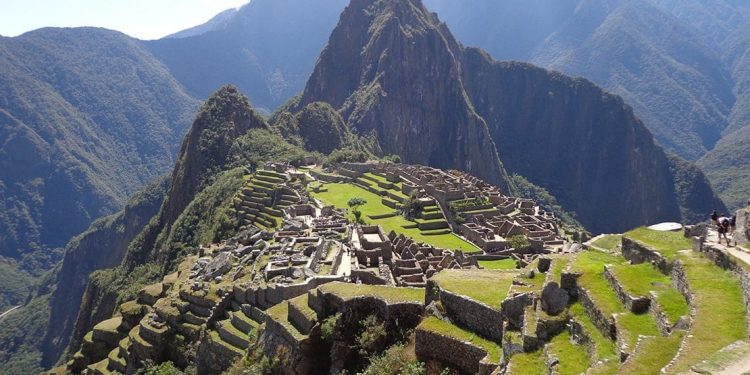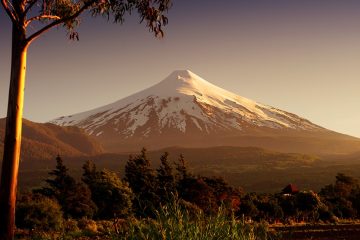
A Continent of Extremes
South America is a continent alive with the spirit of adventure. Across the 12 countries in South America, you can climb mountains, swim with Amazon river dolphins, walk across plains of salt, marvel at red lakes, and see live volcanoes throwing red light into the night sky.
This is a continent of extremes, so you’ll need to pack your sense of adventure along with the insect repellent — if you visit any of these South American travel destinations you’re in for a wild ride.
Narrowing down your selection of travel destinations is tough, so we’re here to help. Here are some of the best places to travel in South America.
Machu Picchu, Peru
Machu Picchu isn’t just a ruin; it’s a mountaintop citadel. Machu Picchu is the high point of many travelers’ time in South America — literally, in some cases.
The grand Incan city sits high in the Andes, layered in mist and mystery.
Machu Picchu was constructed in the 15th-century and was later abandoned, only to be rediscovered again early in the 20th-century. The buildings are astounding not only for their location, but for their complexity and intricacy — the huge stone blocks are fused without mortar.
A true marvel, Machu Picchu is without a doubt one of the best travel destinations in South America.
Adventurous spirits can reach the city via the Inca trail, one of the most famous and rewarding multi-day treks in South America.
Iguazu Falls, Brazil and Argentina
The largest waterfall system in the world is the kind of jaw-dropping, awe-inspiring sight that makes you remember why you travel. Seeing Iguazu Falls is a visceral experience and a reminder of the sheer force of nature.
Iguazu is a chain of falls that stretch for nearly two miles — they’re so big that they span the border between Brazil and Argentina.
You can access the Falls from either country, with the Brazilian side famous for panoramic views of the pounding water, and the Argentinian side known for paths that weave around the waterfalls, getting you so close you’ll be drenched in mist.
Taking a Kruger National Park safari is an adventure of a lifetime. We go over everything you'll need to know when planning your trip into the wild.
Salar de Uyuni, Bolivia
The Salar de Uyuni in Bolivia resembles a blindingly white desert. This is the world’s largest salt flat, and one of the more surreal travel destinations in South America.
If you visit in wet season, water pools on the flats making the surface perfectly mirror the sky, creating one of the most amazing spectacles you’re ever likely to see.
Visiting the salt flats isn’t solely about walking across the snowy-white crystals — the massive expanse of salt lies in a landscape studded with rock formations and islands covered in cacti.
Tours to the Salar usually continue onward through a Mars-like environment where you can see flamingos strutting through red lakes and barren mountains streaked with many different colors. The whole experience is ethereal and unlike anywhere else in the world.
Pucon, Chile
This little town in Chile’s Lake District is the place to go and dive headfirst into nature. There are hiking trails into temperate rainforests, lakes spreading out like blue gems around town, and kayaking, rafting, and horse riding opportunities to take you deeper into the lush wilderness.
Still not enough? Set your sights on the active volcano looming over Pucon, throwing red fire into the sky at night. Thrill-seekers can climb the volcano and peer down into the belly of the Earth.
The list of things to do is endless, so even though this is a tiny town, you might end up staying for weeks.
Buenos Aires, Argentina
Travel destinations in South America are usually ancient ruins or places of spectacular natural beauty, but Buenos Aires deserves a mention as the most fascinating city. A massive urban sprawl, it’s the center of history, culture and tango in Argentina.
Picture yourself walking through cobblestone streets and seeing dancers moving to the sounds of a rusty accordion played under the light of flickering street lamps. Buenos Aires really is this magical.
You’ll never be at a loss for what to do in Buenos Aires. It’s the place to dine on red steaks and wine, and to walk from sophisticated European parks to the colorful chaos of the working-class neighborhood La Boca. It’s a city that will enthrall you and challenge you in equal parts, always leaving you wanting more.
Plan to spend at least three days in the city if you want to get a taste of porteño life.
Looking for skiing destinations with superior views, miles of powder and stellar apres-ski options? These are the best ski resorts for all that and more.
The Lost City, Colombia
This one is for everyone who ever wanted to be Indiana Jones. Nothing can make you feel like an intrepid explorer as much as trekking through jungle to reach a mysterious lost city.
La Ciudad Perdida doesn’t have the same fame as Machu Picchu, but it is every bit as interesting. Set deep in the Sierra Nevada mountains behind Santa Marta, the city was built around 800 AD by the Tayrona people, who were wiped out by the Spaniards.
In its heyday, around 4,000 people are thought to have lived in the Lost City.
You will have to hike for days to reach the ruins, battling humid jungle, mosquitoes, and a damp that will permeate everything you own, but it’s worth every minute. Along the way, keep an eye out for the thatched homes and shy figures of the indigenous people who still live in the rainforest.
Lake Titicaca, Bolivia and Peru
The largest lake in South America, Titicaca straddles the border between Bolivia and Peru. High in the Andes, the lake is a vast stretch of water that shimmers a deep blue, ready for every photo opportunity.
It’s much more than just a pretty lake, though — it holds great significance in indigenous culture, believed by Andeans to be the birthplace of the sun. Some old traditions still hang on here, and visitors can get a glimpse of a place where crops are still grown by hand, llamas are pets, and women wear bowler hats in the fields.
